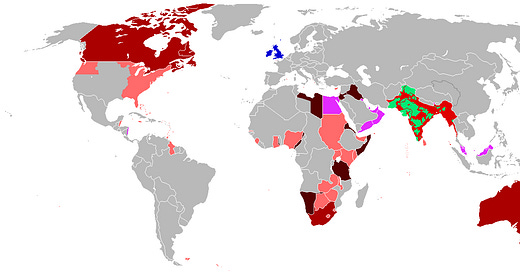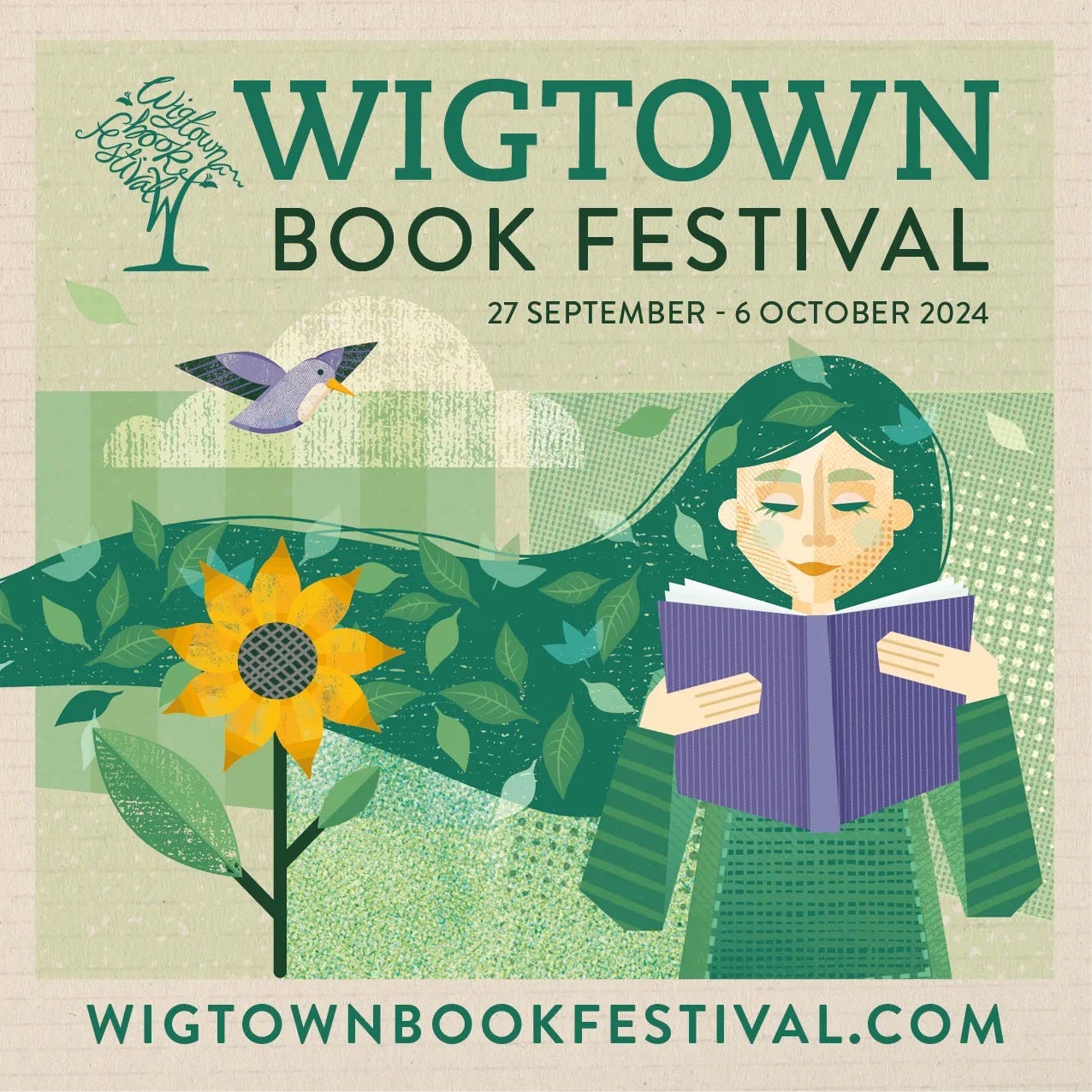Change Everything No 25: The British Empire, racism and 'fake news' cover-ups
Why study history? The more things change, the more they stay the same
Book news
Yep, I’ll be there with Change Everything: looking forward to two events on Saturday September 28.
The British Empire - purveyor of fake news
We are prone these days - as human beings have perhaps always been prone - to the thought that what we are experiencing, the impact of new technologies we are encountering, the horrors and weird twists of history, are unlike those any humans have ever before experienced. And that we are inventing or seeing new ways of being in the world. Reading Caroline Elkins’ Legacy of Violence: A History of the British Empire, I have found plenty of arguments against such a claim, as well as such a litany of violence and horror that I have sometimes had to step away from it. Another reminder of the horrors inflicted by men standing on the very floor of the House of Lords that I regularly frequent.
I have long been a sceptic that the age of social media presents some uniquely new challenges in terms of abuse and “fake news” - both have always been standard political currency. There is no “good old days” of reasoned debate and polite behavior.
My go-to comparison has always been the pamphleteering of the English Civil War, which rose to levels of abuse that would be hard to beat, but I may have to shift instead to quoting Max Weber on the Daily Mail, which started (founded in 1896) as it has continued on. During the Boer War, Elkins says, it “presented a debased and primitive Boer Republic allegedly murdering wounded British soldiers and innocent civilians”. (p. 83) Work like this led Max Weber to fret about the rise of the press barons. “The journalist worker gains less and less, as the capitalist lord of the press, of the sort of ‘Lord’ Northcliffe, for instance, gains more and more political influence.” (p. 111) You can put the social media tycoon of your choice in that sentence and it would sit on many media pages today.
As for fake news, Elkins reports on Winston Churchill in the House of Commons debating the Amritsar (Jallianwala Bagh) massacre, “creating political fact through historical fiction”, claiming “it is an extraordinary event, a monstrough event, an event which stands in singular isolation.” This from a man who had seen with his own eyes slaughters by British troops on the North-West Frontie and the Sudan. (p. 140) That without going to the treatment of civilians during the Boer War, when the British perfected the weapon of the concentration camp, having initially experimented with it in India.
We knew this was a time of blatant and outright racism (plus ca change), but even I was set back by reading The Times on the Secretary of State for India, Edwin Montagu, who was committed to the Empire but horrified by the behaviour of Colonel Reginald Dyer, who commanded Amritsar troops, denouncing his behaviour as “a doctrine of terrorism”. The Times commented: “Mr Montagu, patriot and sincere English Liberal as he is, is also a Jew, and in excitement has the mental idiom of the East.” (p. 142)
What times they were. “A year later he [Montagu] had yet another dust-up with Churchill, who was by then the colonialsecretary. The issue this time was Indian rights in Kenya. Montagu suppported ending Indians’ legally enabled segregation from European spaces. For his part, Churchill not only outmanouvred his ailing foe but also declared his unyielding support for the rich and fertile White Highlands, located in central Kenya, to remain exclusively white-owned in perpetuity. A few weeks later, after a ministerial faux pas that would normally have gone unchecked, Montagu resigned frim the cabinet. He lost his parliamentary seat in the next general elections. Within two years, tarred for his moralizing and relentless demands for widespread accountability in the empire, Montagu was dead at forty-five.” (p. 143)
Yet this is not quite all bad news. The League of Nations may have been a “product of empire”, and support for empires built into its very heart, but the size and strength of the League of Nations Union in the UK - nearly 3,000 local branches and more than 400,000 members at its peak, with nearly a million members at some time - was civil society seeking another way beyond war. It was “a fair-minded and civic collection of individuals who were determined to keep the peace through internationalism… if “self-fashioned in Britain’s imperial image. It was an image that reflected the myths of empires civilizing benevolence and humanity”. (p. 127)
So, okay, even the good news is pretty tempered in this comprehensive account of the British empire. But it is important that the facts are laid out - of the 250 conflicts that the Empire engaged in in the 19th century alone, a record of warmongering to well match the US’s. For defenders of empire like the Regius Professor of Moral and Pastoral Theology Nigel Biggar, who launched his “Ethics and Emire” project in 2017, claiming - “Not allowing our imperial history to be rubbished is important because if indeed our imperial history was all that they say it was, namely a litany of atrocity, then the moral authority of the West in eroded” (p. 6) - are wrong.
Rather, we can have no claim to moral authority in the 21st century unless we acknowledge all of the evils we used our military and economic power to inflict in the past, in colonial and neocolonial times. The degree of suspicion with which the Global South has regarded Kyiv, after Russia’s attack on Ukraine, just because of our backing for it, is a symptom of a damaging, but rightful, continuing suspicion of Western motivations and trustworthiness that can only be tackled by acknowledging the truths of the past.
Picks of the week
Reading
The fascinating Unending Capitalism How Consumerism Negated China's Communist Revolution, posits that the Mao era was just as capitalist as the reform period that came after. For those who like talking about the “new Cold War”, and the world being divided into two camps, something of a corrective. And a great read about the social experience of navigating the difference between rhetoric and reality.
Among those recollecting their acquisition of the “Three Greats” (wristwatch, bicycle and sewing machine), is a middle school teacher, who as a child was the first in his class to get a wristwatch. “When he wore his white canvas wristband to meet his girlfriend’s parents for the first time, they regarded him as an inappropriate suitor because his conspicuous consumption indicated a lack of maturity rather than a status symbol.” (26) But conversely, for a potential bride, possession of, or even desire for, a sewing machine was a symbol of femininity, despite industrial associations, “driven by advertising and popular representations in the mass media”. (27) And the Central Committee “circulated a report by local cadres in Guangdong province which argued “Using gifts to build good business relationships may be a capitalist approach to business, but such practices have positive effects on the development of socialist businesses.” (34)
It reminded me of in the early 1990s visiting the backpacker haven of Yangshuo in Southern China. There were still then two currencies, RMB (local money) and FEC (Foreign Exchange Certificates). Foreigners were only supposed to have and use the later, which meant the price of everything was about three times higher. Elsewhere in China one surruptitiously changed money in alleys, but in Yangshuo little old ladies stood on street corners loudly and hopefully yelling the only words of English they knew, “change money?” They would probably in the Fifties and Sixties have been chasing those sewing machines.
Listening
Britain’s Secret Atomic Tests in Australia: how did they happen? Pure bootlicking by recently elected and longserving Australian Prime Minister Robert Menzies - and the hope that it might mean Australia got the weapons too. What did people know? Practically nothing, and certainly the Australian state was so incurious about its Aboriginal population it had little to no idea where they were - which was in harm’s way. And what are the continuing environmental health impacts? Certainly significant, although still very poorly understood.
Thinking
I have a Tik-Tok account, but I probably spend about two minutes a week watching Tik-Tok videos from other people. Occasionally funny animal behaviour can hold me briefly, and the plant indentifications have ensured I’ve got plantain and broad-leafed plantain clearly in my head (not very hard). But if you also aren’t caught, but wonder what’s there and what’s the attraction, this article offers quite a handy explanation in words - it is seeking gratification that never quite arrives - so you don’t have to watch videos.
Researching
The more we look, the more the sophistication of bees continues to amaze. And it is worth remembering that these insects are among the most studied - how many more have capacities far beyond which our arrogance about human essentiallism have been prepared to contemplate. In some ways better at navigation than are humans, “can store their navigation experiences in their long-term memory through spatial vectors created in the brain. This ability allows them to fly straight home after long and difficult-to-navigate journeys”.
Photo by Kym MacKinnon on Unsplash
Almost the end
Still getting over the claim that anyone might think that recent decades have been “a golden age” for UK universities. Unpayable tuition fees, zero-hours, short-term contracts for staff, far too much money being spent on shiny buildings, treating overseas students as cash cows, publish-or-perish, the pressure to commercialise your research… the neoliberal university has been terrible for its people, and for the development of knowledge and wisdom. (And yes, I made a Tik-tok video about this, which has proved quite popular.)
What did you think?
You can also find me on Instagram, Facebook, LinkedIn, TikTok and X.








Particularly interesting this week, thank you.
Useful material for the ongoing "discussions" on twitter.
Although sometimes they degenerate into insults & blocking, some do go the other way - a couple of instances of long exchanges with people I disagree with this week, which ended up in respectful & cordial disagreement and also mutual learning. It can be done, sometimes, and each one is a step forward.
Social media where I agree with everyone I meet seems so unproductive.
Thank you, interesting as usual. I have recently been nurturing an interest in history in my Grandson. A little bit sneaky, as it was through his new hobby of metal detecting! I am glad to say that his passion for insects, fossils and minerals and rocks remains strong! He is 13.